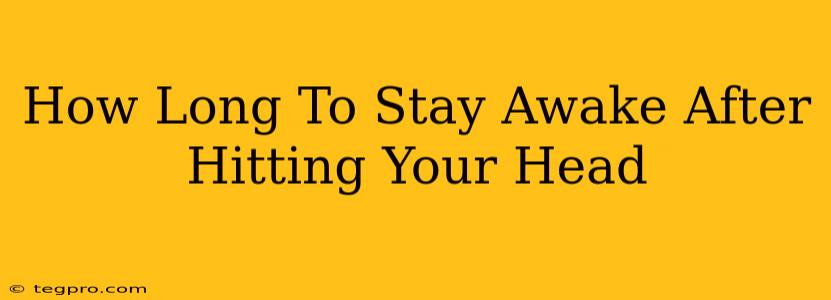Hitting your head, even seemingly mildly, can be a serious matter. Knowing how long to stay awake after a head injury is crucial for assessing the severity and ensuring appropriate medical attention. This isn't about simple bumps; we're talking about understanding the potential for concussion and other head trauma.
Understanding the Risks of Head Injuries
A head injury, ranging from a minor bump to a severe blow, can cause a concussion or other serious damage. Concussions are brain injuries that disrupt normal brain function. Symptoms can appear immediately or develop over time. Ignoring even minor head injuries can have severe consequences.
Why Staying Awake Matters
Staying awake after a head injury allows for observation of potential symptoms. While staying awake doesn't guarantee you'll be okay, it gives medical professionals a better chance to assess your condition and identify any developing problems. Changes in alertness or consciousness are key indicators of a serious head injury.
How Long Should You Stay Awake? There's No Magic Number.
There's no specific timeframe to stay awake after hitting your head. The critical factor isn't the duration of wakefulness, but rather the observation of your symptoms. Even if you stay awake for hours, but develop concerning symptoms later, you need medical attention.
Warning Signs Requiring Immediate Medical Attention:
- Loss of consciousness: Even a brief loss of consciousness is a serious sign.
- Severe headache: A headache that worsens over time or is accompanied by other symptoms.
- Vomiting or nausea: Repeated vomiting is a critical warning sign.
- Dizziness or balance problems: Difficulty standing or walking steadily.
- Confusion or disorientation: Trouble remembering things or understanding your surroundings.
- Blurred vision or double vision: Changes in your eyesight.
- Slurred speech: Difficulty speaking clearly.
- Seizures: Any involuntary muscle contractions or spasms.
- Weakness or numbness: In any part of your body.
- Unequal pupil size: Noticeably different sizes of your pupils.
- Persistent drowsiness or sleepiness: Difficulty staying awake even after resting.
If you experience ANY of these symptoms after hitting your head, seek immediate medical attention. Don't wait to see if it gets better.
When to Seek Medical Attention After a Head Injury
Even without the severe symptoms listed above, seek medical attention if you have:
- A significant blow to the head.
- Persistent headaches.
- Memory problems or confusion.
- Changes in personality or behavior.
- Any lingering concerns about the injury.
It's always better to err on the side of caution. A medical professional can properly assess your condition and provide appropriate treatment.
Post-Injury Care and Prevention
Following a head injury, rest is crucial. Avoid strenuous activity and alcohol. Follow your doctor's instructions carefully.
Preventing head injuries:
- Wear a helmet when engaging in activities like biking, skateboarding, or contact sports.
- Drive carefully and avoid distractions.
- Make your home safer by removing tripping hazards and securing loose objects.
Remember, your health is paramount. Don't hesitate to seek medical attention if you are concerned after hitting your head. Early diagnosis and treatment can significantly improve the outcome. This information is for general knowledge and doesn't replace professional medical advice. Always consult a doctor for any health concerns.

